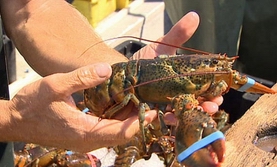
The animal rights group started its push to have stores ban the lobster sales over concerns with how their claws are bound, that they may not be fed for months while they are shipped and how they are cooked.
"As we all know, they are usually boiled alive which seems to us one of the most gruesome deaths you can imagine," he said.
Klosterhalfen said getting all the major supermarkets in Germany to stop selling lobster was one of the group’s most successful campaigns.
"We started the campaign last year basically and it was a very quick victory," he said.
He said German restaurants still have lobster on the menu and he said the country doesn't import a lot of lobster so the boycott won't have a huge impact on Canadian sales.
The Albert Schweitzer Foundation was started in 2000 with its “mission to relieve as much suffering as possible.” The group says it stands for vegetarianism and veganism because “no form of commercial animal husbandry can solve the ethical problem of unnecessary killing.”
Seafood exports
Seafood exports, especially lobster sales, are a big business in New Brunswick.
The province was Canada's largest exporter of seafood in 2012, with exports valued at $967.2 million, followed by Nova Scotia at $915.4 million and British Columbia at $871.5 million.
Lobster is the most valuable Canadian seafood product, which accounted for $1 billion in Canada’s overall seafood exports.
Lobster is also the New Brunswick's most valuable seafood export.
But the German supermarket ban on lobster sales may not have a huge impact. In 2010, Germany did not crack the top 11 countries in terms of New Brunswick’s seafood exports.
Certification attempts
Klosterhalfen said he's heard of attempts by seafood producers in Canada and the United States to obtain the approval of the London-based Marine Stewardship Council.
The council uses its blue “ecolabel” and fishery certification program to recognize industries that use sustainable practices.





